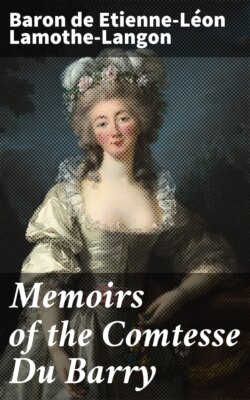Читать книгу Memoirs of the Comtesse Du Barry - baron de Etienne-Léon Lamothe-Langon - Страница 16
На сайте Литреса книга снята с продажи.
Оглавление*This gentleman would have been an able coadjutor for Sir
Robert Walpole.—Trans.
You know how, as first president of the parliament of Paris, he succeeded his father as vice-chancellor. At the resignation of the titular M. de Lamoignon*, the elder Maupeou received his letters of nomination, and as soon as they were registered, he resigned in favor of his son. The Choiseuls had allowed the latter to be nominated, relying on finding him a creature. I soon saw that the Choiseuls were mistaken.
*In September, 1768. (au.)
It was in the month of October, that Henriette, always my favorite, came to me with an air of unusual mystery, to say, that a black* and ugly gentleman wished to see me; that on the usual reply that I was not visible, he had insisted, and sent, at the same time, a cautiously sealed note. I took it, opened, and read these words:—
*i.e., black-haired and/or dressed in black (Gutenberg ed.)
“The chancellor of France wishes to have the honor of presenting his respectful homage to madame la comtesse du Barry.”
“Let him come in,” I said to Henriette.
“I will lay a wager, madame, that he comes to ask some favor.”
“I believe,” replied I, “that he is more frequently the solicited than the solicitor.”
Henriette went out, and in a few minutes led in, thro’ the private corridors which communicated with my apartment, his highness monseigneur Rene Nicolas Charles Augustin de Maupeou, chevalier and chancellor of France. As soon as he entered I conceived a good opinion of him, altho’ I had only seen him walk. His step was firm and assured, like that of a man confident in the resources of his own talents.
“Madame la comtesse du Barry,” he said, “would have a right to complain of me, if I did not come and lay my person at her feet. I had the more impatience to express to her my devotion, as I feared she had been prejudiced against me.”
“How, monseigneur?”
“The gate by which I entered the ministry—”
“Is not agreeable to me, as being that of my enemies, but I feel assured that you will not side with them against me.”
“Certainly not, madame; it is my wish to give you pleasure in every thing, and I flatter myself I may merit your friendship.”
After many other compliments, the Chancellor asked me, with much familiarity, when my presentation was to take place, and why it had not yet occurred. I replied, that the delay arose from the intrigues of Choiseul, and the king shrunk from the discontent of a handful of courtiers.
“I am sorry for it,” said M. de Maupeou; “in the first place, madame, because of the interest I take in you, and also because for his majesty, it would be a means of striking terror into the opposing party. You know, madame, how annoying parliaments are to all your friends, and with what bitterness those of Bretagne and Paris, at this moment, are pursuing the duc d’Aiguillon.”
“Do you think,” I replied with emotion, “that matters are unfavorable towards him?”
“I hope not, but he must be warmly supported.”
“Ah! I will aid him with all my influence. He is no doubt innocent of the crimes imputed to him.”
“Yes, certainly. He has done no other wrong than to defend the authority of the crown against the enmity of the parliaments.”
We continued some time to talk of parliaments and parliament men: then we agreed that M. de Maupeou should see me again, accompanied by the duc d’Aiguillon, who should have the credit of presenting him, and he left me with as much mystery as he had entered.
When the king came to see me, I said to him, “I have made acquaintance with your chancellor: he is a very amiable man, and I hope that he will not conduct himself improperly towards me.”
“Where did you see him?”
“Here, sire, and but a short time since.”
“He came then to visit you?”
“Yes, in person, that he might obtain the favor of being permitted to pay his court to me.”
“Really what you tell me seems perfectly unaccountable. He has then burst from the hands of the Choiseuls? It is amusing. Poor Choiseul, when soliciting for Maupeou, he most tremendously deceived himself.”
“At least, sire, you must own that he has given you no fool.”
“True. The chancellor is a man full of talents, and I do not doubt but that he will restore to my crown that power which circumstances have deprived it of. However, if you see him familiarly, advise him not to persuade me to extreme measures. I wish all should work for the best, without violent courses and without painful struggles.”
These last words proved to me the natural timidity of the king.
“I knew very well,” added the king, “that Maupeou would not prove a man for the Choiseuls. The main point is, that he should be mine, and I am content.”
Louis XV was then satisfied with the chancellor, but he was not equally so with the comte Jean.
“I do not like,” said he to me, “your Du Barry monkey. He is a treacherous fellow, who has betrayed his party, and I hope some of these mornings we shall hear that the devil has wrung his neck.”
